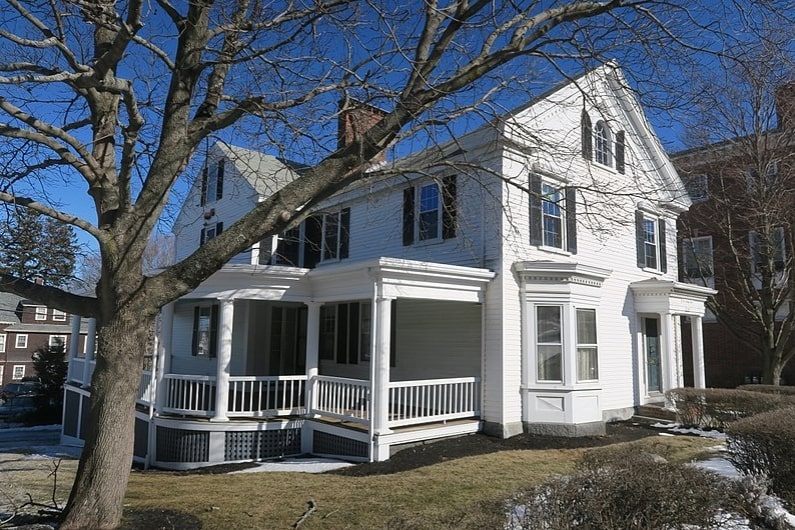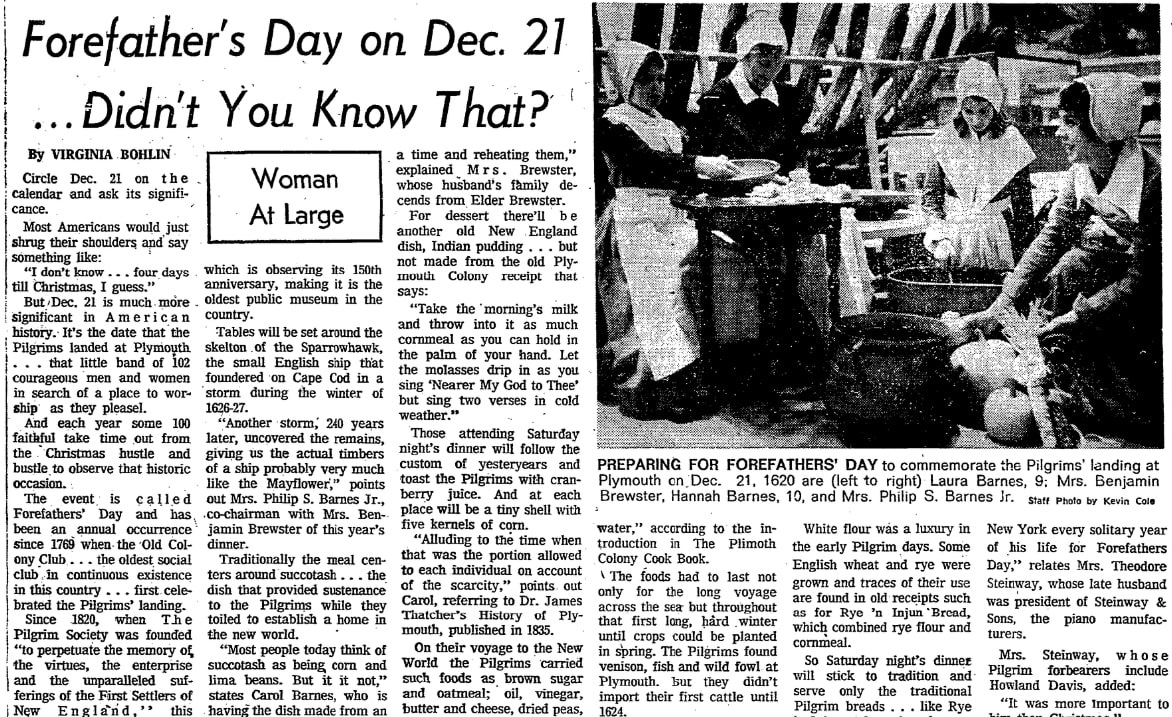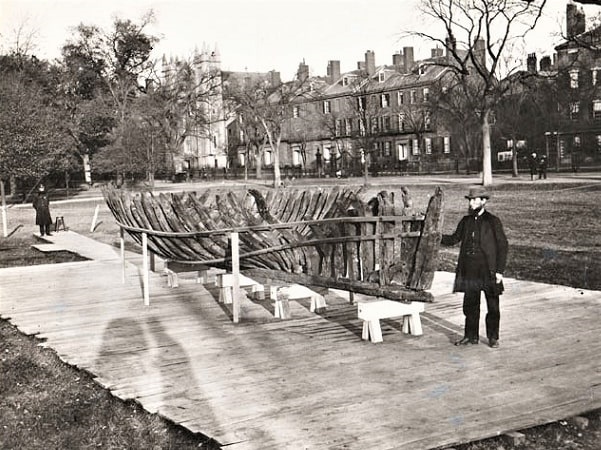Introduction: In this article, Melissa Davenport Berry continues her series profiling descendants of the Mayflower settlers, focusing on the Barnes and Brewster families of Plymouth, Massachusetts. Melissa is a genealogist who has a blog, AnceStory Archives, and a Facebook group, New England Family Genealogy and History.
Today I continue my series on “Who’s Who” for Mayflower descendants with the Barnes and Brewster families of Plymouth, Massachusetts, who descend from Mayflower passengers John Alden, William Brewster, John Howland, Edward Doty, John Tilley, and William Bradford.
A cherished holiday is Forefathers’ Day, celebrated on December 21* to commemorate the Pilgrims landing at Plymouth Rock in 1620. The tradition began in Plymouth with the Old Colony Club in 1769.

The Barnes and Brewster families celebrated the holiday with traditional garb and grub.
In 1974 the Boston Herald featured Barnes and Brewster relatives in Pilgrim period attire gearing up for Forefathers’ Day.

The article reports:
“The event is called Forefathers’ Day and has been an annual occurrence since 1769 when the Old Colony club (the oldest social club in continuous existence in this country) first celebrated the Pilgrims’ landing. Since 1820, when the Pilgrim Society was founded ‘to perpetuate the memory of the virtues, the enterprise and the unparalleled sufferings of the First Settlers of New England,’ this organization has sponsored Forefathers’ Day.”
For the 1974 celebration, Mrs. Philip S. Barnes Jr. (nee Carol Ann Walter), along with Mrs. Benjamin Brewster (nee Anne Withington), co-chaired the event. While they tended the meal preparations, they shared hearty history on the colony.
As the article reports:
“Tables will be set around the skeleton of the Sparrowhawk, the small English ship that foundered on Cape Cod in a storm during the winter of 1626-27. ‘Another storm, 240 years later, uncovered the remains, giving us the actual timbers of a ship probably very much like the Mayflower,’ points out Mrs. Philip S. Barnes Jr.”
According to the Pilgrim Hall Museum:
“The Sparrow-Hawk was buried in Orleans, Massachusetts, known as ‘Old Ship Harbor.’ The timbers were uncovered in a great storm. The ancient hull was removed and reassembled. It was on exhibit at the Boston Common and then given to the Pilgrim Society in 1889. It is the only surviving remains of a 17th century trans-Atlantic vessel.”
Carol and Anne detailed old Plymouth-style recipes of their Pilgrim ancestors:
“‘Most people today think of succotash as being corn and lima beans. But it is not,’ states Carol Barnes, who is having the dish made from an old Plymouth recipe. It calls for pea beans, corned beef, fowl, hulled corn, turnips and potatoes, and is served in soup plates.
“‘The Pilgrims used to freeze it, cutting off chunks at a time and reheating them,’ explained Mrs. Brewster, whose husband’s family descends from Elder Brewster.”
The women also talked about dessert:
“For dessert there’ll be another old New England dish, Indian Pudding… but not made from the old Plymouth Colony recipe that says: ‘Take the morning’s milk and throw into it as much cornmeal as you can hold in the palm of your hand. Let the molasses drip in as you sing Nearer My God to Thee, but sing two verses in cold weather.’”
Another interesting detail of the meal:
“Those attending Saturday night’s dinner will follow the custom of yesteryears and toast the Pilgrims with Cranberry juice. And at each place will be a tiny shell with five kernels of corn. ‘Alluding to the time when that was the portion allowed to each individual on account of the scarcity,’ points out Carol, referring to Dr. James Thatcher’s History of Plymouth, published in 1835.”
Carol listed the food items the Mayflower passengers had on the voyage over:
“Brown sugar and oatmeal; oil, vinegar, butter and cheese; dried peas, prunes and raisins; bacon, salt pork, dried beef and fish; turnips, cabbage, onions and parsnips; spices and jellies; brandy, juice of lemon, drinking water, and beer.”
The provisions were not just used on the trip over but were expected to last through the first winter until crops could be planted.
In the New World, they ate venison, fish and wild fowl, and began importing cattle in 1624. White flour was a luxury so, since necessity is the mother of invention, Rye ’n Injun Bread was the substitute, made with rye flour and cornmeal – and on the menu for the 1974 dinner.
Many came from all over to celebrate Forefathers’ Day, and one visitor that year was Ruth Gardner Davis Steinway, daughter of Howland Davis and Anna Shippen, and wife of Theodore Edwin Steinway (a former president of the piano dynasty Steinway & Sons). (More coming in another story).
Ruth’s parents were both prominent members of the Mayflower Society. Her father was trustee of the Pilgrim Society and served as governor general of the General Society of Mayflower Descendants in 1909. Ruth told the Boston Herald:
“My father came up from New York every solitary year of his life for Forefathers Day. It was more important to him than Christmas.”
You can read more on the history of Forefathers’ Day at the Old Colony Club.
Note: Just as an online collection of newspapers, such as GenealogyBank’s Historical Newspaper Archives, helped tell the story of the celebration of Forefathers’ Day, they can tell you stories about your ancestors that can’t be found anywhere else. Come look today and see what you can discover!
Stay tuned for more Mayflower Who’s Who.
* The Pilgrims landed in Plymouth, Massachusetts on 21 December 1620. However, Forefathers’ Day is actually celebrated on Dec. 22. Why? According to Wikipedia: “In adjusting the date to the Gregorian calendar, the anniversary was erroneously established on December 22 instead of December 21.”
Genealogy:
Children of Mercie Hatch and Philip Stanley Barnes Sr.
- Mercie/Mercy Barnes married William Elliot Whitney
- Parker Loring Barnes married Mary Frances Stearns
- Souther Barnes married Francis Loretta Halunen
- Philip Stanley Barnes married Carol Ann Walter
- Brooks Barnes
Related Article:
